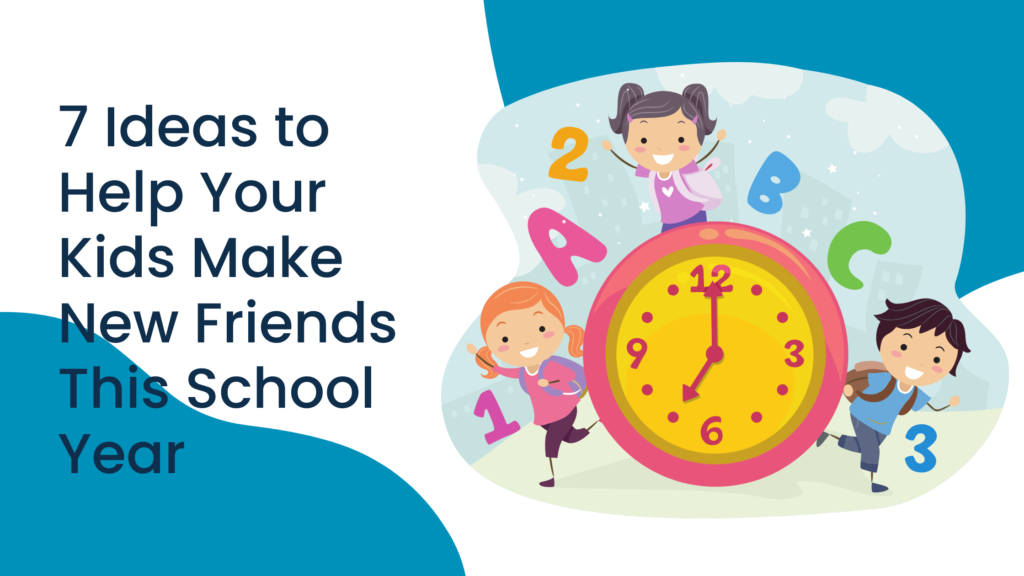
With the conclusion of summer break comes the “reset” button that throws children headfirst into the new school year. Which means new teachers, classes, locker combinations, peers, and difficulties. Moving to a new school magnifies these challenges along with learning to make new friends. Even kids who aren’t moving to a school may find themselves searching for a new friend group or in a class where they don’t know many of their classmates.
Making new friends while starting a new school year may seem stressful, but with the right amount of forethought and planning, your child will be able to breeze right into new friends and a great school year. We can’t guarantee our kids’ social success, but we can provide them with the resources, self-assurance, and creative thinking they need to succeed.
Here are ways to held your child make new friends this school year.
Participate in a group or club
Making new acquaintances at school might be challenging for some students, we see you introverts. A good way to ensure your child enjoys school and makes friends easily is to sign them up for a class or extracurricular activity they’re interested in.
Small-group classes in physically demanding activities like soccer, cooking, or martial arts are excellent settings for making new friends. Other kids may get excited about socializing with their classmates by taking lessons like ballet or dance, which fosters creativity.
Invite Children to Your Home
Your kid will have a lot easier time interacting with other children if you have a little party or get-together. This group of children may be from your school or neighborhood. This is one of the simplest ways to encourage sociability in your child. Shy or introverted children may be more comfortable in your own home. This familiar setting helps them to open up to new friends. The smaller setting removes distractions and stress for both your child and their friend.
Help them develop effective communication skills
You may help your kid become more social by teaching them important interpersonal skills.
Examples of skills:
- Help your children learn to voice their thoughts in a manner that builds bridges rather than burns them.
- Teach them to see the value each child in their class brings to the group.
- Teach them to pay attention while hearing.
- Teach them to respect other people’s experiences.
Make new friends at kid-friendly activities and playgrounds
Making friends at school might be difficult for some children, but it may be less of a challenge in a less structured environment like a playground or children’s museum. Your child is more likely to make friends with other kids who share their interests if you take them to activities that cater to their passions. Playgrounds, indoor play areas, and public pools are great places to meet other kids. Getting out and meeting new kids to connect with may also be accomplished by attending children’s activities hosted by libraries, churches, and other community organizations.
Set an example for healthy dialogue about feelings at home.
To ensure your kid develops healthy social skills, you can start by setting a good example at home. The greatest way to help a kid develop socially and emotionally is to model such traits yourself at home. No parent is perfect, but setting a good example with your family in terms of communication and caring can go a long way.
Don’t micromanage their social life.
Managing your child’s social life requires a balance. Parents must give their children many chances to interact with others to build friendships and social skills. When they are young, parents plan play dates, enroll children in schools, and transport them. Parents should watch their children during a playdate, but they shouldn’t exert too much control. Let your children decide what to play and how to manage disagreements. You’ll be amazed at your child’s creativity.
Maintain fair expectations
Every parent wants a happy, well-adjusted kid, but you must set fair expectations. Extraverted and outgoing parents naturally desire the same for their children. Some kids aren’t social butterflies. A quiet, introverted child may prefer a small group of close friends to a big one and a small playdate to a large party.
When it comes to children socializing and making new friends, there is no one-size-fits-all solution; but with your support and encouragement, your child may just find their next friend is sitting right in their new classroom.
If you think your child’s struggles to make new friends this school year stem from anxiety or other mental or behavioral health concerns, request an appointment with one of our counselors.





